International Women's Day 2019
We bring you two articles on the demonstrations and celebrations of International Women's Day. The articles detail the actions of the MST and other social movements throughout Brazil.
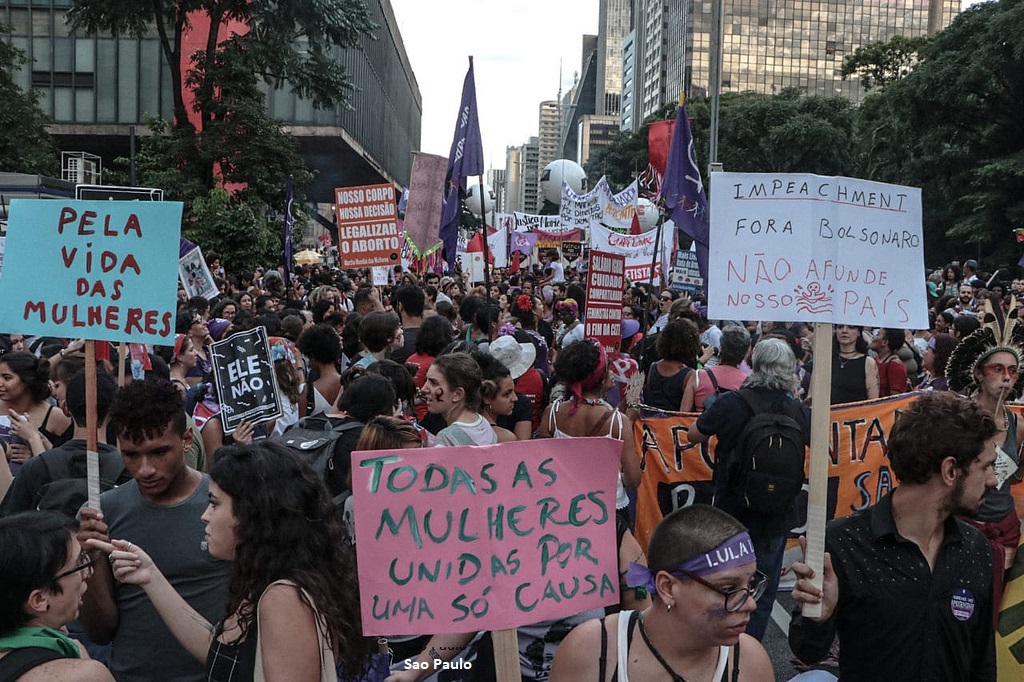
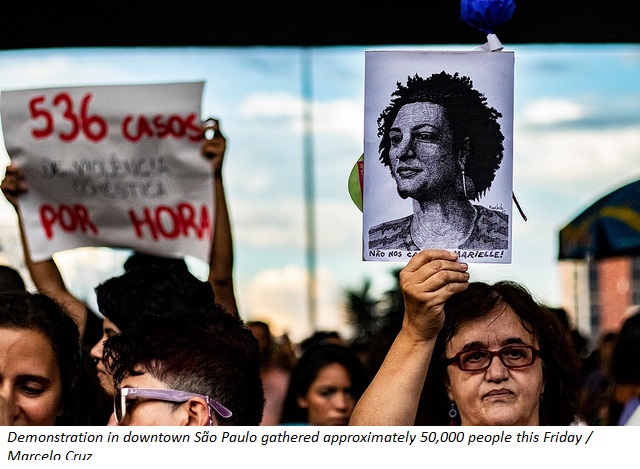
On March 8, women all over Brazil honor Marielle Franco and attack Bolsonaro
Thousands of demonstrators took to the street in all states; 50,000 gathered in São Paulo
Thousands of Brazilians took to the streets this Friday, March 8th, to celebrate International Women’s Day.
With the motto “For women’s life, we are all Marielle,” they marched in cities all over the country to protest against the dismantling of Brazil’s pension system, the country's increasing femicide rates, and the setbacks suffered under the Jair Bolsonaro administration.
The marchers also celebrated the legacy of black activist and Rio de Janeiro councilwoman Marielle Franco, who was brutally murdered on Mar. 14, 2018. A fierce advocate for human rights, Franco became an inspiration for women workers all over the country who fight against injustices. The crime that took her life and the life of driver Anderson Gomes is still unsolved one year after it happened.
The mobilization started early in the morning. Two hundred activists with the Landless Workers’ Movement (MST) and the Movement for People’s Sovereignty in Mining (MAM) occupied a plant of Australian miner Mirabela Nickel in Ipiaú, Bahia state, to protest against predatory nickel mining. The women also denounced the risks of contamination of the local Contas River, less than a kilometer (roughly 0.6 mile) away from the company’s tailings dam.
The sun had just come up in the southern city of Florianopolis, Santa Catarina, when women from La Via Campesina sat for a dialogue circle, where they talked about the impacts of Bolsonaro’s proposed pension reform for rural workers and discussed ways to resist big agriculture and intensive pesticide use in crops. In Chapecó, also Santa Catarina state, indigenous women held a rally at a town square.
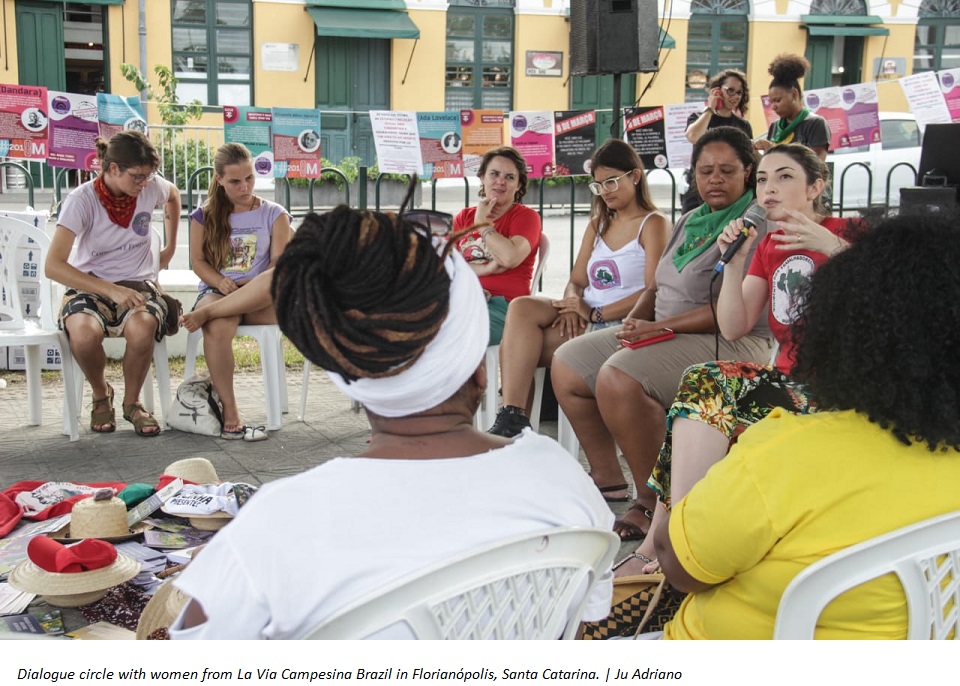
In Rio Grande do Norte state, northeastern Brazil, female small farmers handed 15 tons of food grown in rural settlements across the state. In Porto Alegre, Rio Grande do Sul, they held panels about femicide, violence against women, and reproductive rights in the morning.
The biggest demonstrations took place in the afternoon, when the memory of Marielle Franco was specially honored and protesters chanted against the Jair Bolsonaro administration.
São Paulo
In the city of São Paulo, southeastern Brazil, the March 8th demonstration gathered more than 50,000 people, according to organizers.
Simone Nascimento, an activist with the black movement, attended the rally and spoke about what motivates women to struggle.
“March 8 and other dates when women take to the streets to demonstrate have been decisive for Brazilian people’s resistance. We’ve just had an extremely undemocratic president elected, who has been pushing an agenda to take away our rights, like we’re witnessing now with the pension reform. It’s an agenda that completely tears apart all the rights the [working] class has fought to earn in recent years. This is where an endless, unstoppable fight begins,” Nascimento told Brasil de Fato during the demonstration in São Paulo.
One of the main targets of the protest was the pension reform bill proposed by Jair Bolsonaro, which, if it is passed, would take away rights of workers and retired Brazilians, hurting especially women, who work more and earn less than men.
“We need a reform that can secure people's rights. This reform [proposed by Bolsonaro] not only restricts that, but also attacks the rights that have been accomplished after a lot of fight and struggle,” lawyer Neuzely Fernandes said. “Women have to have their rights respected. And it’s not the government or the Congress who is proposing a reform the way we need and deserve,” she added.
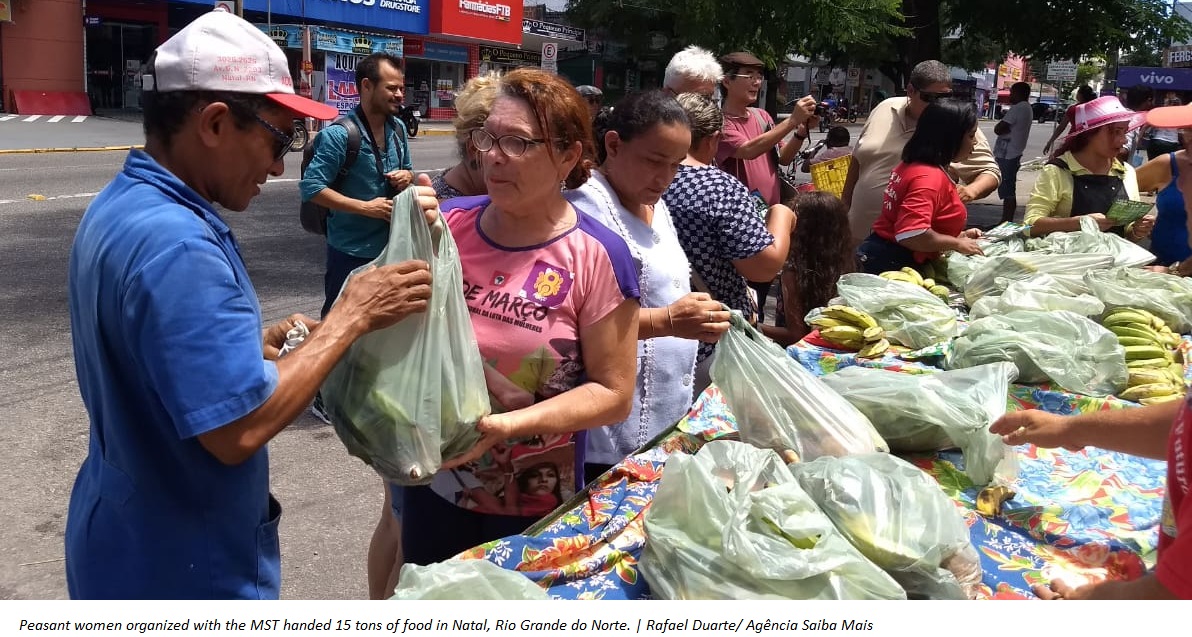
Rio de Janeiro
In Rio de Janeiro, more than 50,000 people took to the streets, according to organizers.
State representative Mônica Francisco and Bruna Silva, the mother of 14-year-old Marcos Vinícius, who was killed by the police during an operation in the Maré slums last year, attended the demonstration. “I’m here in the name of my people from the slums, to say that this is our time, our voice, and our place,” Silva said.
The widow of Marielle Franco, Mônica Benício, praised her late partner’s legacy and explained why she takes part in the protest on Women’s Day. “We’re here for the life and freedom of all women, for the right to our own bodies the way we want.”
Recife
The International Women’s Day march in Recife, northeast Brazil, gathered 15,000 people with the motto “Marielles: free from sexism and racism, and for a public pension system.”
Before the rally, women held discussions about topics that are part of the feminist agenda, such as the end of violence against women, wage inequality, and femicide.
Fortaleza
In Fortaleza, the demonstration gathered approximately 5,000 people demanding justice for Marielle Franco and freedom for Brazil's ex-president Luiz Inácio Lula da Silva.
The protest also denounced the increasing rate of violent crimes against women in Ceará state, northeast Brazil.
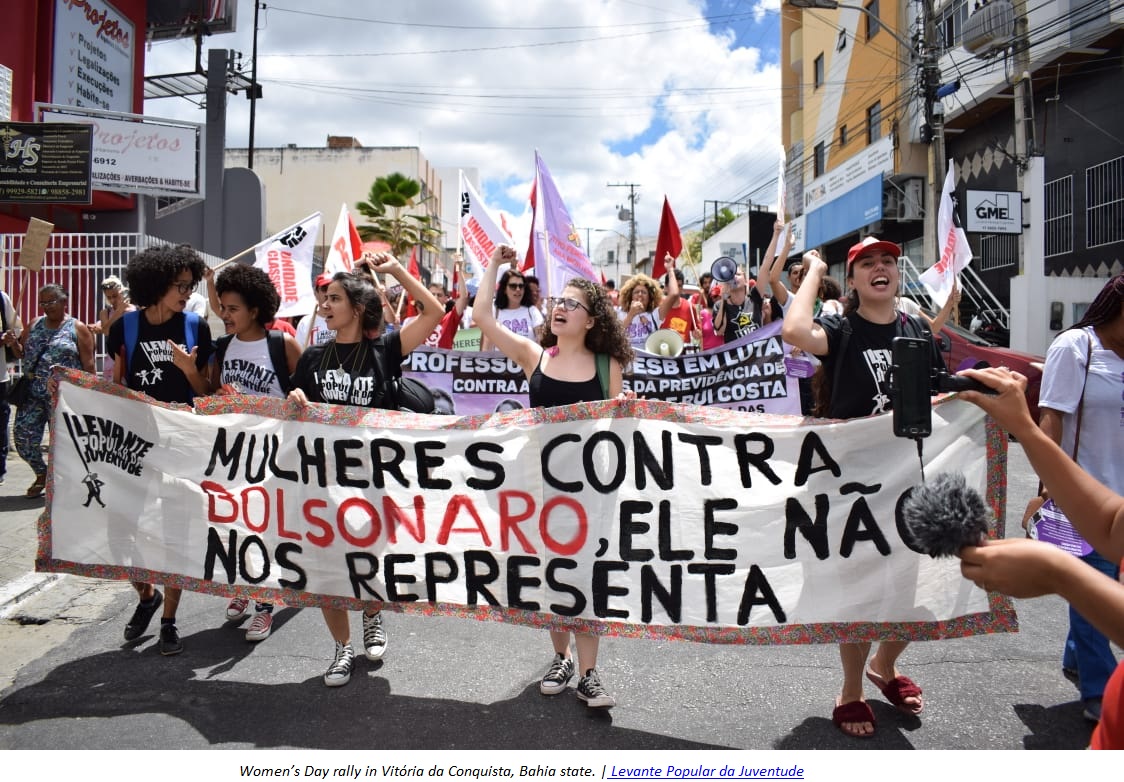
Porto Alegre
In the southern city of Porto Alegre, the Women’s Day rally gathered hundreds of demonstrators and was called “Rally for Women Workers’ Lives.”
They criticized femicide and the attacks of the pension reform bill against workers’ rights. Many small farmers participated in the demonstration and protested against the Jair Bolsonaro administration’s attempts to criminalize the Landless Workers’ Movement and his proposed rules to make it harder for rural workers to retire.
Salvador
More than 64 institutions that fight for women’s rights took part in a religious celebration and the march that started at a downtown square in Salvador, Bahia.
The parade honored Marielle Franco with a huge yellow flag with the councilwoman’s face painted on it.
Organizers of the march in Salvador said the election of Bolsonaro represents a war on women, poor people, black people, and LGBTQ+ people.
Lu Sudré and Juca Guimarães | Editor: Mauro Ramos | Translated by Aline Scátola | Brasil de Fato | São Paulo
********************************************************************************
On March 8, MST Women participate in mobilizations in all regions of the country
Unified actions were taken against the violence and the setbacks of the Bolsonaro government
Thousands of rural and urban women took to the streets this Friday (March 8) to fight the dismantling of Social Security, feminicide in Brazil and the setbacks of the Bolsonaro government.
Under the motto: "For the life of women, we are all Marielle!", women guide the need for permanent struggle in combative unity with other movements and organizations in the current moment in which we live.
Follow below the actions in which the Landless women had been present:
São Paulo
In São Paulo a large unified act brought together thousands of women in the Vão Livre do MASP [Plaza of the São Paulo Art Museum]. MST women also participated in acts in Andradina, where 40 women participated in the Regional Encounter of Women of the Settlements and Encampments.
The activity discussed important issues that directly impact women's lives, such as the People’s Agrarian Reform, Social Security reform and the consequences for the countryside, violence and feminicide. In Bauru, the mobilization together with an instrument workshop. The women also performed an action through the streets of the city, claiming the intermittent operation of the Women's Police Station.
The events also took place in Campinas, in Largo do Rosário, Ribeirão Preto, in front of the Esplanade of Pedro II Theater (Praça Central), in Lagoinha (Vale do Paraíba region) with the distribution of zines produced by the Egídio Bruneto Marília and in São José do Rio Preto.
Rio Grande do Sul
In Porto Alegre, women intervened in Largo Glênio Peres to denounce the abusive use of pesticides and violence against women. In the morning they discussed the rise of feminicide and the proposed Pension Reform. In the afternoon they discussed food sovereignty and defense of territories. In Cruz Alta, in the northern region of Rio Grande do Sul, women from Via Campesina also set up a fair with organic products at Praça da Prefeitura.
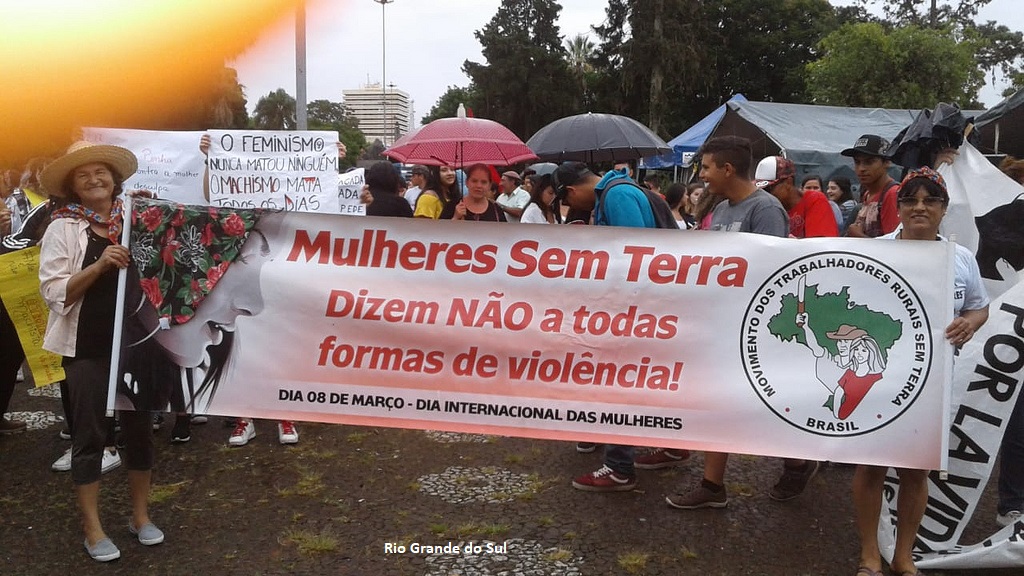
The program included cultural activities, debates on pension reform, withdrawal of rights. In the Public Market of Vacaria, in the Serrana region of Rio Grande do Sul, women also met in talks to discuss the themes of the day. In São Gabriel, in the West Frontier of Rio Grande do Sul, about 50 women mobilized for this International Day of Women's Struggle, holding an organic fair in Praça dos Amores and also making panfletagem.
In Bagé, in a gesture of care for women's lives, MST peasants donated healthy food from Agrarian Reform settlements to the Madre de Deus Catholic Community of Bagé in the region of the Campaign of the state of Rio Grande do Sul. In Candiota, also in the Rio Grande do Sul Campaign, about 150 rural and urban women participated in a public class on the Social Security reform.
In Santana do Livramento, peasants and urban women from the western region of Rio Grande do Sul and Rivera, Uruguay, joined the women's struggle on March 8. Activities took place in the International Park, with matéada, blood pressure measurement, workshops, artistic and cultural presentations, homage to Marielle Franco and Laura Cabreira.
Sergipe
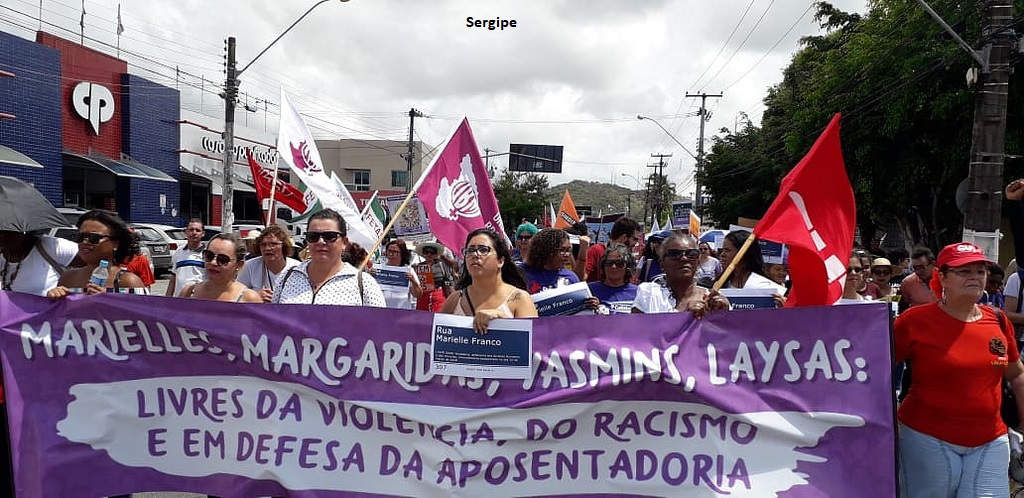
In Sergipe women participated in an act organized by popular sectors. Women from the countryside, the riverside and the city went on the streets of the city through the State Legislative Assembly, the Court of Justice and the National Institute of Social Security (INSS).
large northern river
The Landless Women of the RN participated in the National Day of struggles donating 15 tons of healthy food, coming from diverse settlements of the state.
Alagoas
With a camp set up since the morning of this last Thursday (March 7), around a thousand peasants from all regions of Alagoas occupy Maceió with the flags of struggle of women of the countryside during the National Day of Struggles of the Landless Women.
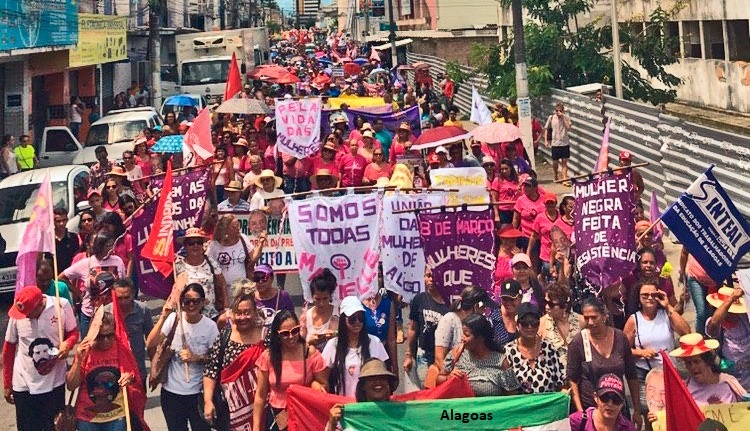
After several actions on the first day of activity, peasants were added today (March 8) to the group of urban workers in the act that marks the passage of the International Day of Women's Struggle. The action toured the streets of Maceió in dialogue with society in denouncing violence against women, against the Reform of Social Security, as well as defending Agrarian Reform and the freedom of former President Lula.
Participating in the actions in the capital, the Landless organized in the Pastoral Land Commission (CPT), the Movement for the Liberation of the Landless People (MLST), Movement of the Work (MVT), Movement for the Land (MLT) of the MST.
Protesters also met in Arapiraca, in the Agreste of Alagoas, in the Old Town Hall Square.
Santa Catarina
Throughout the day, women gathered alongside the Municipal Public Market in Florianópolis, in conversation wheels and cultural presentations. From there, too, was the concentration of the great march that swept the whole city.
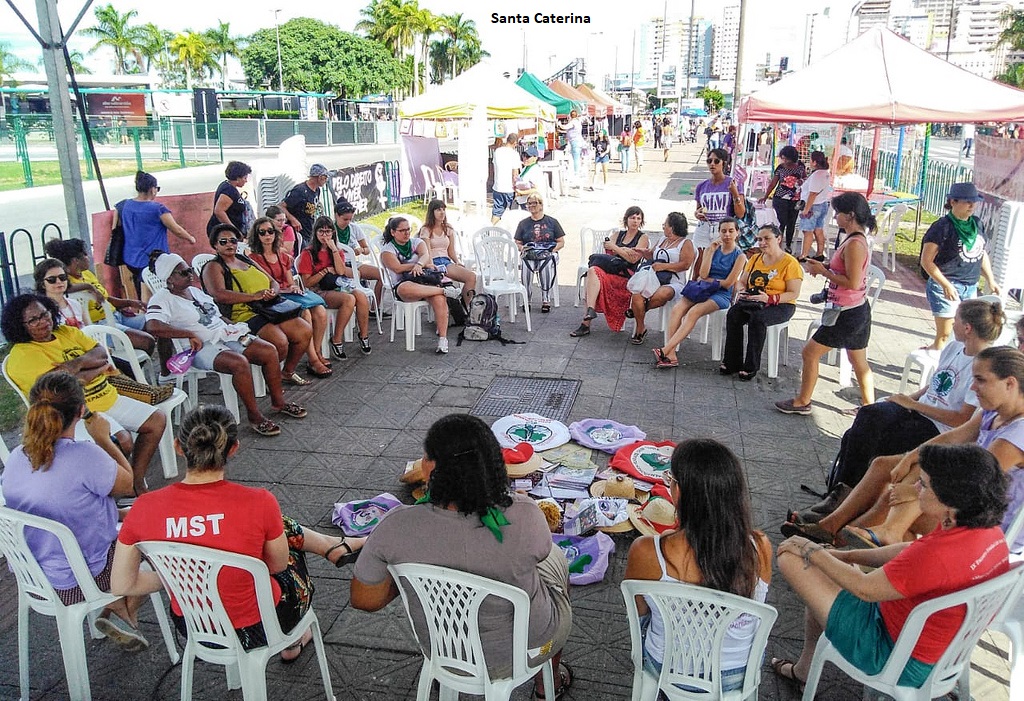
Bahia
A great unified action gathered 400 women in Vitoria da Conquista. In the extreme South, the women's group of the brigades Joaquim Ribeiro and Nelson Mandela, held a seminar on the current political situation. The meeting took place in the city of Teixeira de Freitas and brought together about 200 rural workers and their partners with the MST. In the Southern Lowlands, 250 women denounced mining company Mirabela.
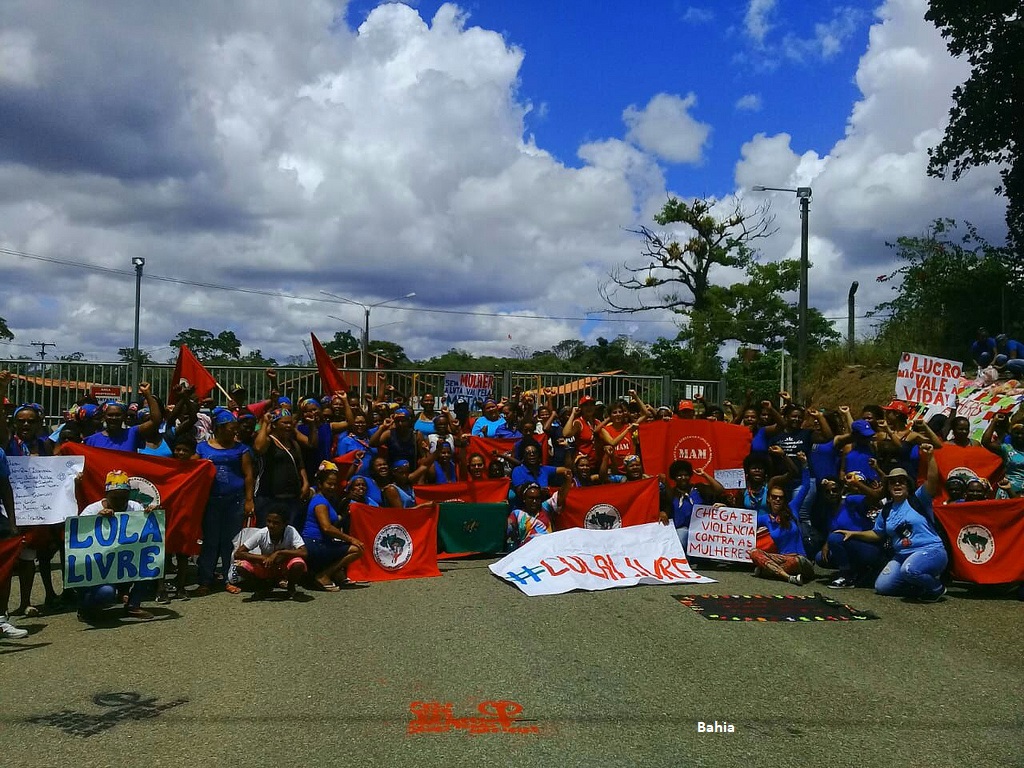
The action took place in the municipality of Ipiaú. In Santa Cruz de Cabrália, the school of the countryside is located in the settlement of Luiz Inácio Lula da Silva, a peasant cafe with production of settlements in the region. The activity counted on about 250 women who debated on the current political scene and the increase of the feminicidio in every country.
Maranhão
In Imperatriz, in Maranhão, the Landless women, indigenous people, students, farm workers and the city made a great march through the streets. Already in the capital São Luis, a great unified action gathered diverse forces in walking through the streets.
Paraná
In the central region of Paraná, women promoted the Resistance and Agrarian Reform Fair in the Pedro Alzirez Giraldi central plaza in the municipality of Quedas do Iguaçu.
Women with their printed cloth, flags donated healthy, processed foods and handicrafts produced and made in the settlements and encampments of the region.
Food was also donated to two entities in need in Quedas do Iguaçu: Casa Lar asylum and Casa de Abrigo orphanage. In Cascavel, the demonstration happened in front of Cascavel's main church, against the conservatism that persecutes women and the LGBT population, agribusiness, inequality, racism and violence. In Curitiba, a great march will leave Santos Andrade Square towards Boca Maldita, in the center of the city.
Espírito Santo
In Vitoria, a unitary action followed by a walk through the city, brought together comrades from various popular movements of the countryside and the city.
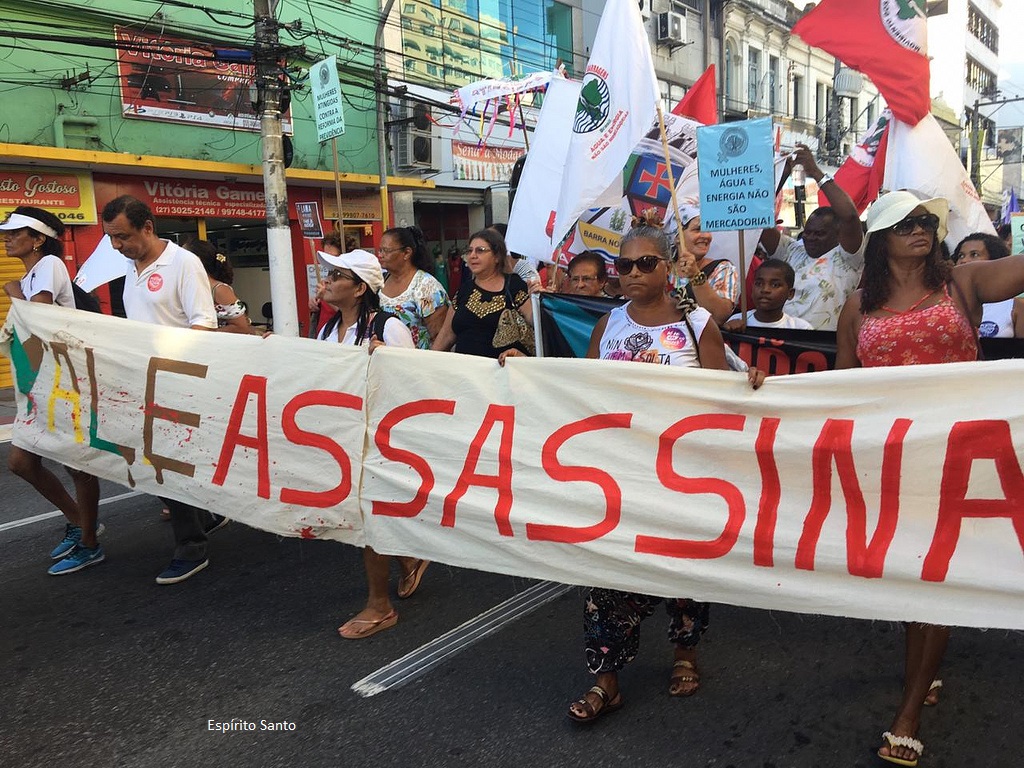
Minas Gerais
In the Vale do Rio Doce, Minas Gerais municipality, the women of the MST held a great march as part of the National Day of Struggles that continues until the 14th. In Belo Horizonte, two events were called for this Friday (March 8). The Popular Front of Brazil called the women to the demonstration in the Square Raul Soares. Already the Front People Without Fear chose the theme: "Our lives are worth more".
The two actions are in Plaza Seven, with the reading of a manifesto jointly written between the women.
Pará
In the Metropolitan Region of Belém, the action was concentrated in the Municipal Market in São Brás, counting on more than 1,000 women divided among four wings. Already in the Xingu region, in the city of Altamira, about 500 women carried out pamphlet and walk through the center of the city, finishing in front of the Forum, where they denounced the feminicide through small crosses that were placed in the ground. In Marabá it was carried out walking through the center of the city with more than 300 women.
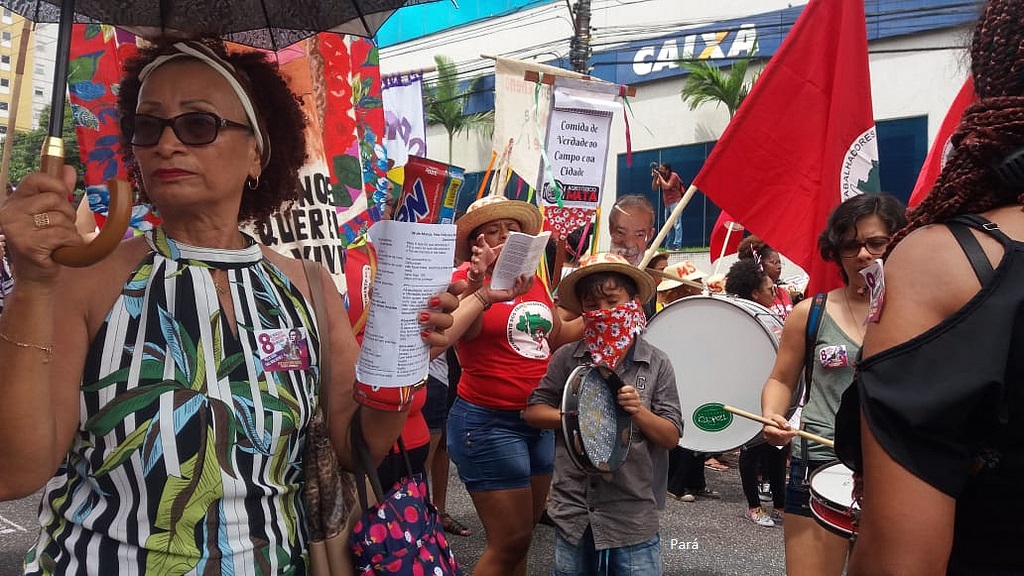
Mato Grosso do Sul
As part of the unified Landless Women's Struggle, a seminar was organized: "Women in the Struggle against Social Security Reform!", a space for debate among unions, popular movements. Following up on the day, a Cultural and Union meeting was also held in the capital's square.
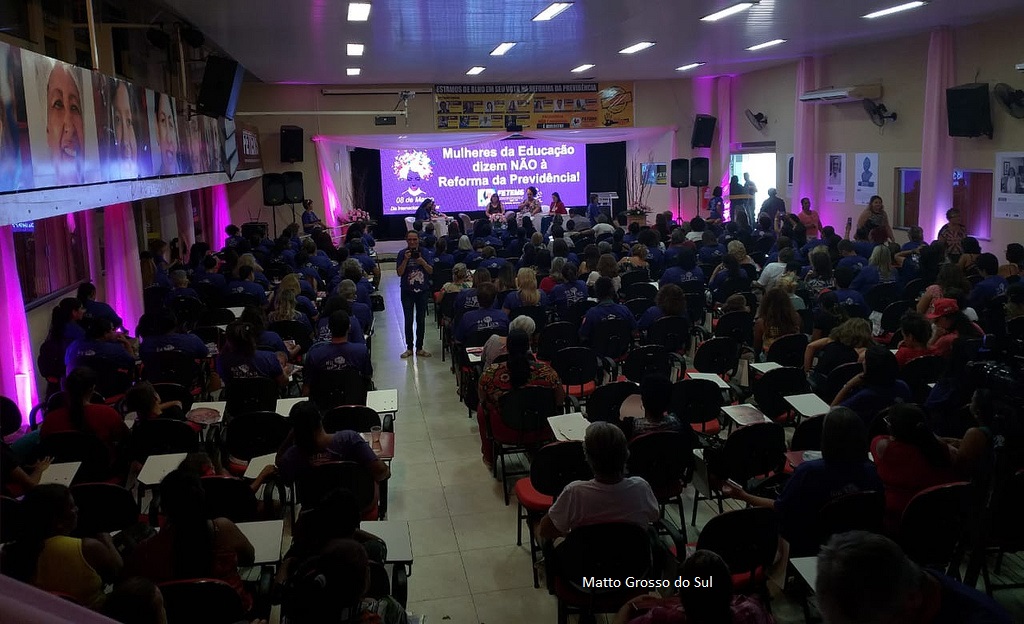
Da Página do MST*
* This balance is preliminary and will be updated according to the arrival of information.
** To see more photos and videos about the acts all over Brazil, access our official networks on Facebook, Twitter and Instagram.
